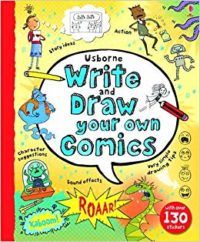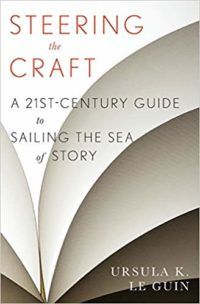
6 Inspiring Workbooks and Guides for Budding Authors
I love books about writing. I have a whole shelf full of them at home, always ready to dip into if I’m in a rut with my work, or need to think of a way around a plot problem that I’ve got myself into, or just if I need to remind myself why I do this in the first place. Reading how other writers – particularly writers I love – feel about and practice their craft is always an inspiration, and makes me feel closer to the stories they write as well as giving me new ways to think about my own. There are a multitude of creative writing guides and workbooks out there, each giving a new insight into the writing process, and offering advice that might help you get unstuck on that tricky scene.
 Find Your Voice by Angie Thomas
Find Your Voice by Angie Thomas
If you loved The Hate U Give and On The Come Up, great news: YA superstar Angie Thomas has written a guided journal, stuffed with advice, exercises, quotes and prompts to kickstart your own debut novel. Designed to take you all the way through your first draft, it helps you dig deep into your characters, plot out your act structure, and refine your ideas to make your story the best it can be. And on top of that, it’s a beautiful book.
642 Tiny Things to Write About by The San Francisco Writers’ Grotto
Small enough to carry around in your bag, this book of prompts is a lifesaver. It gives you a whole load (well, 642, to be exact) of ideas to write about – some multi-staged, some complex, some simple, in a wide range of genres. Every writer will find something to inspire them in this little collection. (I use it a lot for writing competitions that have the rather unhelpful prompt of ‘stories on any topic’ – give me something to work with, dammit!) A quick flip through can help you get started for a freewriting session, or perhaps start a train of thought that will eventually lead to a whole finished novel.
 Write and Draw Your Own Comics
Write and Draw Your Own Comics
If you’ve got a young comics fan in your life, this book by author Louie Stowell and illustrators Jess Bradley, Neill Cameron, Freya Harrison, Laura Howell, Adam Larkum and Igor Sinkovec is a fantastic resource to help them get started making their own comics. With tips on drawing, storyboarding, coming up with plot ideas and getting everything down on paper, this book gives kids a great foundation to work from.
Save the Cat! by Blake Snyder
An obvious pick, but a really useful one – Save the Cat! has helped me so much with learning plot structure (always the weakest parts of my stories – I’m a pantser who needs to be a plotter to actually be able to write something good). Save the Cat! is aimed at screenwriters, but writers in any genre can use it. It’s an especially good read when you’re working through a structural rewrite, and has great advice on trimming off any unnecessary scenes or tangents to get to the core of the story.
 Steering the Craft by Ursula K. Le Guin
Steering the Craft by Ursula K. Le Guin
Written by an absolute titan of literature, Steering the Craft by Ursula K. Le Guin is a joy. A revised version of her classic book, with plenty of examples and updates to reflect the modern literary scene, this book is like sitting down with Le Guin herself and learning from her vast experience. The book includes exercises that you can adapt for individual or group writing, so it’s a really versatile tool that you can use to kick your creativity up to the next level.
Writing the Other by Nisi Shawl and Cynthia Ward
A fundamental read for any writer who wants to write characters whose identities are different from theirs, Writing the Other gives guidelines for authors who want to avoid using harmful stereotypes when writing people of different races, genders, sexualities, abilities, and other aspects of identity. The book has advice, exercises and practical examples, and if you want to broaden your knowledge even further, the Writing the Other website runs regular online and offline courses, seminars and workshops that will help you avoid pitfalls and make your work the best it can be.
A book can’t do the writing for you, or make you sit with your notebook or laptop and get the words down, but they can certainly be a rich source of inspiration, advice, and sometimes commiseration on how tricky getting that plot point just right can be. Hopefully, these books will help you write your own amazing story – or at least give you a good read in your downtime.
If you’re looking for that special notebook for your next writing project (and aren’t we all?), check out 10 Gorgeous Journals That Will Inspire You To Write. For a deeper dive into the writing process, try some of the books on our 100 Must-Read, Best Books on Writing.



 Find Your Voice
Find Your Voice Write and Draw Your Own Comics
Write and Draw Your Own Comics Steering the Craft
Steering the Craft













